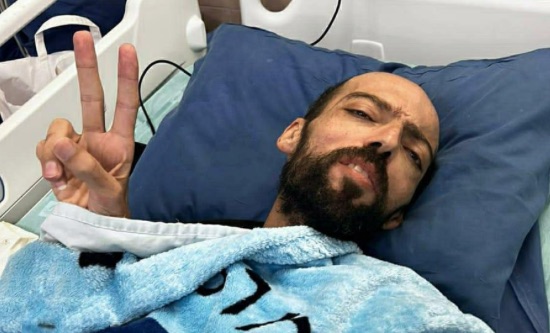
‘There is no Palestinian political prisoner without hope. This is part of the resistance of sumud (steadfastness) of Palestinian political prisoners, the knowledge that there is someone behind me.’ – Asim al-Ka’abi
On 31 August, after a gruelling 182-day hunger strike which drove him dangerously close to death, Palestinian political prisoner Khalil Awawdeh won his victory over the Zionist prison regime. Another extreme example of the Israeli occupation’s ‘administrative detention’ sentencing, Awawdeh had been interned indefinitely without charge or trial. As a result of his extraordinary act of resistance, he now has a release date set for 2 October. Despite the vindictiveness of a system which pushes Palestinian detainees towards such acts, the victory of Awawdeh has inspired others on the inside towards winning collective victories in the days since. With the Oslo-era Palestinian bourgeoisie still entrenched in Ramallah (see article below), the resistance of political prisoners points to the real leadership of oppressed Palestinians.
Awawdeh has spent 12 years in Zionist prisons since 2000. This includes two stints totalling five years in administrative detention. A third such sentence, in December 2021, led to Awawdeh’s initial hunger strike. After fasting for 111 days, Awawdeh secured an agreement for his release, yet the regime reversed its promise and kept him locked up. With options narrowing, he returned to hunger strike alongside others resisting in similar ways on the inside. Other forms of prisoner protest in the Zionist gaols over the months which followed included mass days of action on 17 April for the annual Day of the Political Prisoner and a range of nationally-coordinated events, seminars and mobilisations to commemorate assassinated Palestinian Marxist Ghassan Kanafani on 8 July.
Told of his victory while handcuffed to his hospital bed, and weighing just 42kg, Awadeh affirmed: ‘This resounding victory extends the series of great victories achieved by the mighty and honourable people of this nation.’
The following day some 1,200 other Palestinian prisoners announced their intention to strike en masse, in an organised campaign for their release. The strike was called off within days after authorities agreed to meet demands to stop arbitrary transfers of prisoners serving life sentences. Awawdeh had been joined by many other hunger striking prisoners during his own fast, with other victories secured in the period since. On 12 September, Adal Musa suspended his 37-day strike after winning a release date of 6 November 2022. Like Awawdeh and many other strikers, Musa had been held under administrative detention.
Administrative detention
The collective struggle of Awawdeh and other Palestinian political prisoners was highlighted by Dalal, wife of Khalil Awawdeh, vocally leading the campaign for his freedom on the outside: ‘There are many [Palestinian] prisoners who have been through this experience and were victorious. Khalil, with his will and determination, will be victorious.’ That prisoners are forced into such life-threatening decisions speaks to the inherent torture of administrative detention, which allows Zionist authorities to detain Palestinians without trial on the basis of ‘evidence’ collected by counterintelligence agencies like the Shin Bet.
As with counterinsurgency strategies including population transfer, collective punishment, house demolitions and political assassinations, administrative detention finds roots in the pre-1948 British occupation of Palestine. Britain’s brutal suppression of the Palestinian revolutionary movement from 1936-39 was solidified into colonial law with the 1945 Defence (Emergency) Regulations, later providing the ‘legal’ basis of Zionist administrative detention.
Administrative detention is imprisonment without trial. The same internment policy was used by the British government against the Irish people in the 1970s and is a staple of colonial administration. The detention orders are repeatedly renewed, amounting to months and years of internment. Palestinians frequently organise hunger strikes for their release and at the time of writing 743 Palestinians are imprisoned without charge or trial under administrative detention.
Securing release from detention is rarely the end of the struggle for committed militants. On 24 August longstanding political prisoner Asim al-Ka’abi was rearrested in a dawn raid, with neither he nor his family given any detail as to why. This came 16 months after his victorious release following 18 years in prison. As he explained during our August 2021 interview with him published in FRFI 284, continual arrest, rearrest and dispersal within the prison system form part of an organised attack on any kind of stability experienced by Palestinians under occupation. Comrade al-Ka’abi said at the time:
‘My experience is not unique: all Palestinians imprisoned for long periods are moved from prison to prison. I passed through all of the prisons of the Zionist occupation except Ofer. Some prisons I was held in more than once, this is just part of the political system we live under.’
Al-Ka’abi is now being held on administrate detention in Ofer prison in the occupied West Bank. He and 30 of his comrades are launching an open-ended hunger strike for the release of all those held on administrative detention.
The doubly-punitive targeting of ex-prisoners is a recognition of their leadership role. In a statement released on 13 September, the 29th anniversary of the Oslo ‘peace’ agreement, which gave rise to the collaborationist Palestinian Authority, and cemented Israel’s colonisation of historic Palestine, the Samidoun prisoner solidarity network declared:
‘The Palestinian people, from the river to the sea and everywhere in exile and diaspora, have unity in resistance and struggle, while the Palestinian Authority is held in severe disregard. It is clear that the leadership of the Palestinian people and their struggle is the Palestinian resistance, including and at its core, the Palestinian prisoners’ movement.’
Louis Brehony
Fight Racism! Fight Imperialism! No 290, October/November 2022




